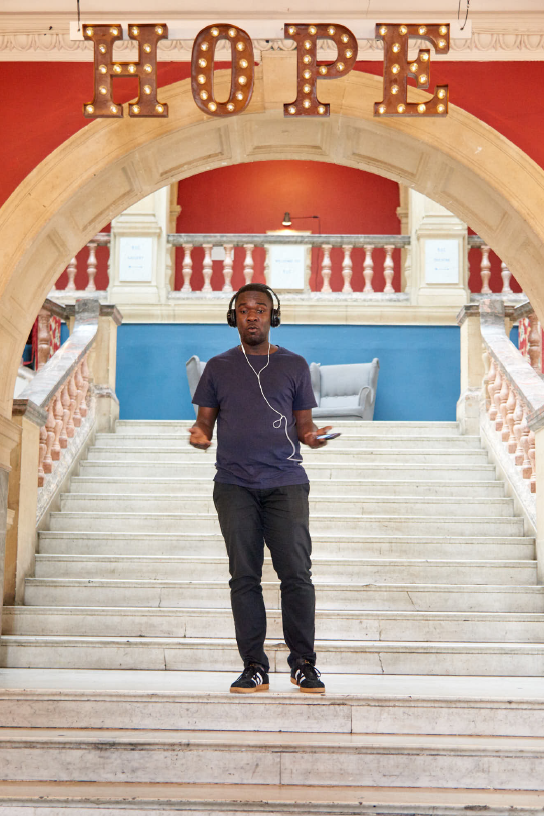Project information

The Verbatim Formula (TVF) has enhanced understandings of care-experienced young people’s needs, enabling this marginalised group to benefit from improved social and educational inclusion, and to become involved in processes of debating, re-shaping, and enhancing policy and professional practices in the care sector. Centring the voices and experiences of young people through the performance of recorded testimonies articulating their experiences and advice, TVF has worked with young people as co-researchers and as creative evaluators of services that are responsible for their care and education.
Improving social and educational inclusion of young, care-experienced people
By gathering testimony in one-to-one interviews with co-researching participants, TVF has generated qualitative data about the experiences of young people in the care system. This process enables participants to articulate their own experiences and develop their own voices, under the protection of anonymity in the subsequent sharing of their testimony with others. Testimony is shared using a ‘headphone methodology’, with performers relaying the voices of young people as accurately as possible to a live audience. Both participants of TVF and their carers testify that its techniques enabled young people who had previously found it difficult to address their own experiences to articulate them, and to motivate them to communicate them with others in public fora having seen their experiences valued and heard by those in authority. Testimonial evidence from over 100 participants engaged by the project to date frequently asserts the transformative impact of this experience for young people. One evaluation records that 80% of participants noted an increase in confidence as a result of their experience of TVF, and that a space was created ‘where participants could finally listen to their inner voices and could freely articulate their aspirations’. Such aspirations commonly involved choices about tertiary education, with facilitators, foster carers and social workers noting the project’s impact upon the participants ‘enthusiasm for university’. One participant stated that being on campus, ‘observing current students’ and talking to people working in the university had ‘changed his mind’ about re-applying for university. Another testified that her TVF residential had helped her ‘to realise that I can achieve my dreams even if they are big’.
Enhancing professional practices in the provision of services for young people in care
Around 300 carers, professionals, and practitioners over seven Local Authorities have been engaged by TVF both directly and indirectly in England as well as 30 in Scotland. They have frequently noted the strong affective power of TVF as a method of training, for embodying and making present the voices of young people, as well as the unique capacity of its approach to create a level forum for conversations that are commonly shaped by hierarchies embedded in the care system. They also note TVF’s capacity to remind them to consider the affective consequences for young people of their policies and procedures. A clinical psychologist described this impact of TVF on their work as a new focus on ‘how to empower young people as much as possible ensuring they are legitimately involved in decision making and meetings’, and a social worker noted that ‘TVF has helped us widen our approach to sharing the experiences of young people in care and elements of it will feature in training to the workforce that will be co-delivered by young people’. In Wandsworth, care-experienced young people became ‘Verbatim Champions’, using TVF’s approach to communicate the experiences of their hard-to-access peers within the care system to its managers. TVF’s participatory methodology has thus been sustainably embedded within the practices of a team of 36 multi-agency professionals who are responsible for nearly 500 looked-after young people.
Influencing policy development in the care sector
These impacts on professional practices in the care system have led to invitations to the project team to participate in the work of policy development with regard to the social and educational inclusion of care-experienced young people. Teams of TVF participants and researchers have given evidence to the Greater London Authority Peer Outreach Team’s Enquiry into Children’s Rights, to a cross-sectoral National Network for the Education of Care Leavers consultation on educational needs and participated in the UK Parliament’s All-Party Group on Children and Young People. After the TVF team were invited to present to the Department for Education and to the Office for Students’ Director for Fair Access and Participation and their team, policymakers noted important impacts upon their thinking. These can be summarised in the words of a Senior Policy Officer at the OfS as ‘putting myself in a care-leaver’s shoes when making decisions and developing policy’. An Access and Participation Manager at the OfS likewise noted that ‘my understanding [of the experiences of young people in the care system] has greatly increased’. A Senior Policy Officer at the DfE noted ‘a change in my thought process’: ‘It is not good enough to assume we know what the right approach is and create policies around this without first checking that what we do is actually what care leavers want. We need to hear what they are telling us instead of assuming we know what they are saying’.
